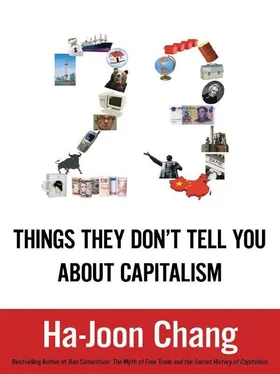All my criticisms so far about the overdevelopment of the financial sector in the last two or three decades are not to say that all finance is a bad thing. Had we listened to Adam Smith, who opposed limited liability companies ( see Thing 2 ) or Thomas Jefferson, who considered banking to be ‘more dangerous than standing armies’, our economies would still be made up of the ‘Satanic mills’ of the Victorian age, if not necessarily Adam Smith’s pin factories.
However, the fact that financial development has been crucial in developing capitalism does not mean that all forms of financial development are good.
What makes financial capital necessary for economic development but potentially counterproductive or even destructive is the fact that it is much more liquid than industrial capital. Suppose that you are a factory owner who suddenly needs money to buy raw materials or machines to fulfil unexpected extra orders. Suppose also that you have already invested everything you have in building the factory and buying the machines and the inputs needed, for the initial orders. You will be grateful that there are banks that are willing to lend you the money (using your factory as collateral) in the knowledge that you will be able to generate extra income with those new inputs. Or suppose that you want to sell half of your factory (say, to start another line of business), but that no one will buy half a building and half a production line. In this case, you will be relieved to know that you can issue shares and sell half your shares. In other words, the financial sector helps companies to expand and diversify through its ability to turn illiquid assets such as buildings and machines into liquid assets such as loans and shares.
However, the very liquidity of financial assets makes them potentially negative for the rest of the economy. Building a factory takes at least months, if not years, while accumulating the technological and organizational know-how needed to build a world-class company takes decades. In contrast, financial assets can be moved around and rearranged in minutes, if not seconds. This enormous gap has created huge problems, because finance capital is ‘impatient’ and seeks short-term gains ( see Thing 2 ). In the short run, this creates economic instability, as liquid capital sloshes around the world at very short notice and in ‘irrational’ ways, as we have recently seen. More importantly, in the long run, it leads to weak productivity growth, because long-term investments are cut down to satisfy impatient capital. The result has been that, despite enormous progress in ‘financial deepening’ (that is, the increase in the ratio between financial assets and GDP), growth has actually slowed down in recent years ( see Things 7 and 13 ).
Thus, exactly because finance is efficient at responding to changing profit opportunities, it can become harmful for the rest of the economy. And this is why James Tobin, the 1981 Nobel laureate in economics, talked of the need to ‘throw some sand in the wheels of our excessively efficient international money markets’. For this purpose, Tobin proposed a financial transaction tax, deliberately intended to slow down financial flows. A taboo in polite circles until recently, the so-called Tobin Tax has recently been advocated by Gordon Brown, the former British prime minister. But the Tobin Tax is not the only way in which we can reduce the speed gap between finance and the real economy. Other means include making hostile takeovers difficult (thereby reducing the gains from speculative investment in stocks), banning short-selling (the practice of selling shares that you do not own today), increasing margin requirements (that is, the proportion of the money that has to be paid upfront when buying shares) or putting restrictions on cross-border capital movements, especially for developing countries.
All this is not to say that the speed gap between finance and the real economy should be reduced to zero. A financial system perfectly synchronized with the real economy would be useless. The whole point of finance is that it can move faster than the real economy. However, if the financial sector moves too fast, it can derail the real economy. In the present circumstances, we need to rewire our financial system so that it allows firms to make those long-term investments in physical capital, human skills and organizations that are ultimately the source of economic development, while supplying them with the necessary liquidity.
Thing 23: Good economic policy does not require good economists
Whatever the theoretical justifications may be for government intervention, the success or otherwise of government policies depends in large part on the competence of those who design and execute them. Especially, albeit not exclusively, in developing countries, government officials are not very well trained in economics, which they need to be if they are to implement good economic policies. Those officials should recognize their limits and should refrain from implementing ‘difficult’ policies, such as selective industrial policy, and stick to less-demanding free-market policies, which minimize the role of the government. Thus seen, free-market policies are doubly good, because not only are they the best policies but they are also the lightest in their demands for bureaucratic capabilities.
Good economists are not required to run good economic policies. The economic bureaucrats that have been most successful are usually not economists. During their ‘miracle’ years, economic policies in Japan and (to a lesser extent) Korea were run by lawyers. In Taiwan and China, economic policies have been run by engineers. This demonstrates that economic success does not need people well trained in economics – especially if it is of the free-market kind. Indeed, during the last three decades, the increasing influence of free-market economics has resulted in poorer economic performances all over the world, as I have shown throughout this book – lower economic growth, greater economic instability, increased inequality and finally culminating in the disaster of the 2008 global financial crisis. Insofar as we need economics, we need different kinds of economics from free-market economics.
Economic miracle without economists
The East Asian economies of Japan, Taiwan, South Korea, Singapore, Hong Kong and China are often called ‘miracle’ economies. This is, of course, hyperbole, but as far as hyperboles go, it is not too outlandish.
During their Industrial ‘Revolution’ in the nineteenth century, per capita income in the economies of Western Europe and its offshoots (North America, Australia and New Zealand) grew between 1 per cent and 1.5 per cent per year (the exact number depending on the exact time period and the country you look at). During the so-called ‘Golden Age’ of capitalism between the early 1950s and the mid 1970s, per capita income in Western Europe and its offshoots grew at around 3.5–4 per cent per year.
In contrast, during their miracle years, roughly between the 1950s and the mid 1990s (and between the 1980s and today in the case of China), per capita incomes grew at something like 6–7 per cent per year in the East Asian economies mentioned above. If growth rates of 1–1.5 per cent describe a ‘revolution’ and 3.5–4 per cent a ‘golden age’, 6–7 per cent deserves to be called a ‘miracle’. [73] Your per capita income will double in ten years, if you are a ‘miracle’ economy growing at 7 per cent. If you are a ‘golden age’ economy growing at 3.5 per cent per year per capita, it will take around twenty years to double your per capita income. In those twenty years, per capita income of the miracle economy will have quadrupled. In contrast, it will take around seventy years for an ‘industrial revolution’ economy, growing at 1 per cent in per capita terms, to double its per capita income.
Читать дальше






![Ally Carter - [Gallagher Girls 01] I'd Tell You I Love You But Then I'd Have to Kill You](/books/262179/ally-carter-gallagher-girls-01-i-d-tell-you-i-lo-thumb.webp)





